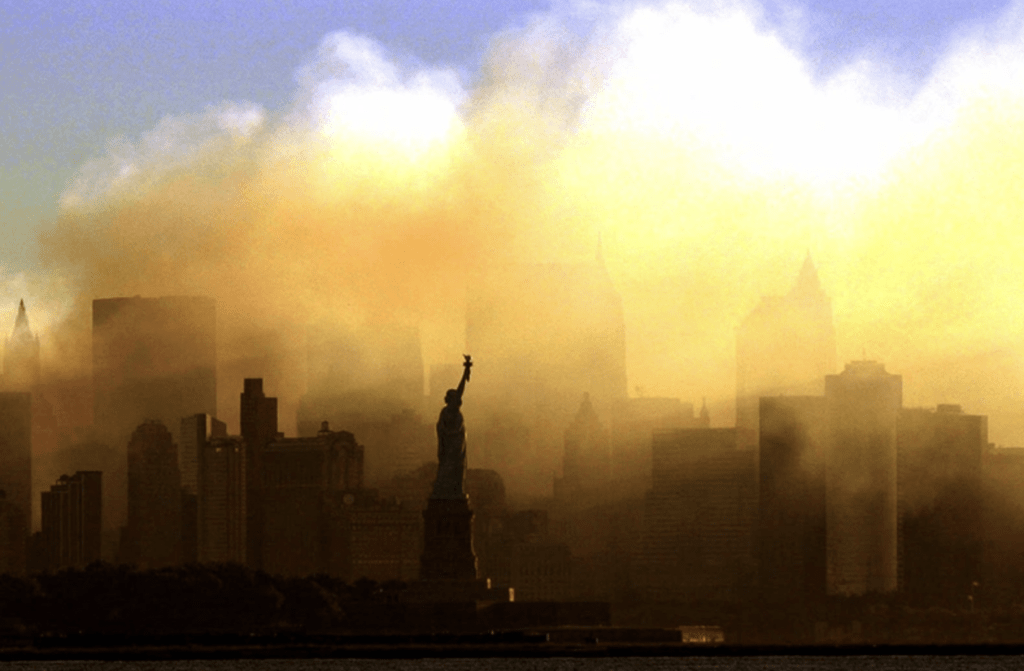Aftermath: Explaining 9/11 When our ‘Here’ was There
I tell her it can’t happen here, but then my daughter sees the ruins of the city we lived in.

AP
Lisa Van Dusen
This piece was first published by the Montreal Gazette on September 27, 2001.
As we were walking to the store the other day, my 11-year-old daughter, Grace, proposed a new game, along the lines of Truth or Dare or 20 Questions.
This one was called “What would you do if … ?” and involved an array of doomsday scenarios: if an army of rabid chimpanzees overran the city; if the Bermuda Triangle started sucking up entire nations; if a rogue asteroid collided with Earth on short notice … .
Until five months ago, we lived in Manhattan. It has now been two weeks since the World Trade Centre was reduced to a sepia ashbin, the site of a horrifyingly abrupt and incidentally televised mass murder. The cognitive dissonance that reduced the rest of us to infants as Sept. 11 ticked on has been overtaken by the massive worldwide effort to process it and absorb the fact that, if someone can organize it well enough to watch their own terrorism live on CNN, then the banality of evil is a thing of the past.
But, the experts say, it has been necessary to reassure our children that they’re safe, that “it can’t happen here.” For Gracie, the enormous issues – plumbed again and again in her classroom and at home – of shock and revenge and unspeakable loss and religious tolerance and incredible bravery, all unfold against the surreal notion that some of the memories she has from a life in a place before here have been rescinded.
As her best friend from our old neighbourhood emailed the next day of the twin towers, “I can’t believe they’re just GONE.” It’s hard to tell your child it can’t happen here when, until recently, there was her “here.”
Sometimes on weekends we’d take the No. 6 train downtown to Battery Park or take the Staten Island Ferry out and from there, the Trade Centre looked beautiful, like a smug silver tuning fork for all the nerve behind it.
We lived on the upper Upper East Side, in Yorkville, on the next block of concrete stoops and shaky fire escapes down from where Jimmy Cagney grew up, at 91st St. and 2nd Ave. We were there for a one-year stop on our way home from eight years in Washington.
Sometimes on weekends, we’d take the No. 6 train downtown to Battery Park or take the Staten Island Ferry out and from there, the Trade Centre looked beautiful, like a smug silver tuning fork for all the nerve behind it, with the clouds echoing by in a thousand different windows. We’d jostle right along with the German tourists for a place on the side of the boat with the view, maybe hanging back a bit because we knew we could see it any time we liked.
I never took Gracie to the top of the trade centre, though I’d been up myself as a tourist and, once, on a long-ago date with her father. From the inside, the Empire State Building always seemed a better bet because the perspective was more breathtaking for being just closer enough to the ground to be indisputably real. From the 86th floor observatory — where we stood two sunsets in a row right after we’d arrived in New York just because we could — you can still see actual people, not just bridges. But the twin towers were part of her daily landscape, and it would be like telling her, here, that Mount Royal was gone, just GONE, as though vaporized one morning by a two-second laser beam from a Tim Burton flying saucer. Only so much worse, because of all the lives lost.
As a parent in New York — unless you’re protected, as much as one can be, by a moat of money — there’s always that fear that the dodgy trade-off for an “interesting” childhood experience for your kid will play out one day in the wrong subway car or Burger King or office building at the wrong time.
As an expatriate parent, beneath the rationalizations of investing short-term career capital accrued there toward long-term career freedom back here someday is the knowledge that the same sense of infinite possibility that drags people to New York works both ways — that yeah, anything can happen, but guess what? … anything can happen.
But there are things that even seasoned New Yorkers getting ready to take on the world from their desks don’t expect first thing in the morning. Which is why that “What would you do if …?” nightmare scenario was so much more horrible. At least on the soundstage leafiness of our Westmount street, hundreds of miles instead of a few subway stops away, it feels possible to say, “It can’t happen here.”
Lisa Van Dusen is associate editor of Policy Magazine. She was Washington columnist for the Ottawa Citizen and Sun Media, international writer for Peter Jennings at ABC News, and an editor at AP National in New York and UPI in Washington.
